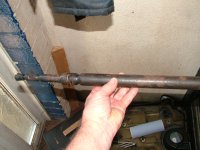In college I was taught, when doing brake hydraulics, to block possible leaks from open pipes by pinching off the flex hoses. This works quite well but I've always been uncomfortable with doing this and maybe causing damage to the hose, especially if it has to be left on for any length of time (or if the hose is quite old) perhaps while you wait for a part. Then I learned to put a crisp packet over the master cylinder filler and screw the top down tight over it. In theory the vacuum so created stops fluid leaking and actually it works quite well and is useful when you are changing the flex hoses themselves. Works better on some than others depending on the design of cylinder reservoir. However it can still leak slowly over an extended time and with modern ABS brakes the last thing you want is air getting into the ABS module. So here's a wee tip many of you more experienced folk will know but probably those who haven't worked on vehicles professionally won't. Rather than describe it in words I'll just post this video:
Remember not to push the pedal down much more than half way to avoid pushing the seals into a part of the cylinder where it wouldn't go in normal operation as doing so can damage the seals.
Edit. Why a crisp packet? I hear you all asking. Because for some reason brake fluid doesn't seem to "melt" the plastic they are made from.
Remember not to push the pedal down much more than half way to avoid pushing the seals into a part of the cylinder where it wouldn't go in normal operation as doing so can damage the seals.
Edit. Why a crisp packet? I hear you all asking. Because for some reason brake fluid doesn't seem to "melt" the plastic they are made from.


